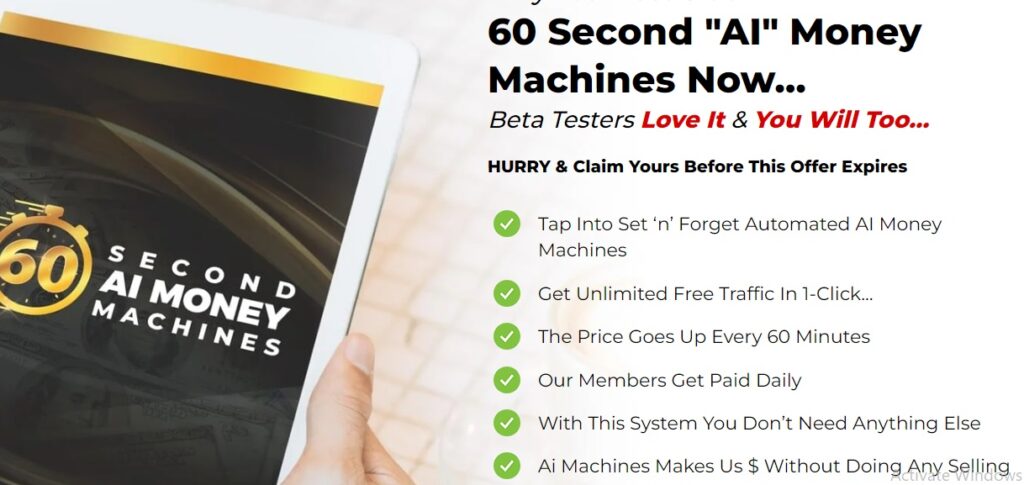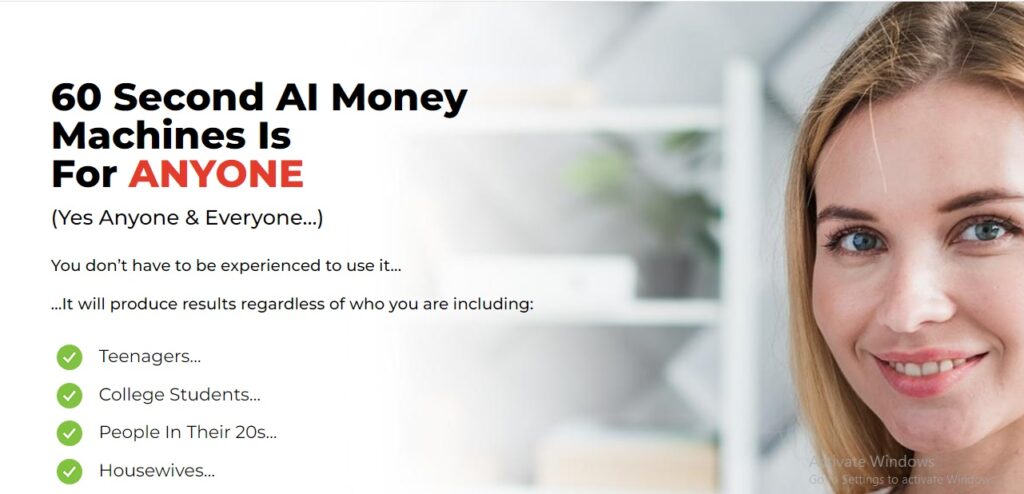
Unveiling the Promises and Realities of 60 Second AI Money Machines
Introduction of 60 Second AI Money Machines:
In the ever-evolving landscape of financial technology (fintech), the advent of AI-powered trading systems has sparked both curiosity and skepticism. Among these innovations, the concept of “60 Second AI Money Machines” has gained considerable attention. Promising quick profits with minimal effort, these systems claim to leverage artificial intelligence algorithms to execute lightning-fast trades, purportedly maximizing returns for investors. However, as with any novel technology promising financial gains, discerning the efficacy and ethical implications of such systems is crucial. In this review, we delve into the mechanics, potential benefits, risks, and ethical considerations surrounding 60 Second AI Money Machines.
Understanding of 60 Second AI Money Machines:
At its core, a 60 Second AI Money Machine is a trading system that employs AI algorithms to make rapid decisions in the financial markets, often within a minute or less. These systems typically utilize machine learning techniques to analyze vast amounts of market data, identify patterns, and execute trades accordingly. Proponents argue that the speed and automation offered by AI can exploit market inefficiencies and generate profits in real-time, outperforming human traders.

>>Click instant access and other details<<
Potential Benefits of 60 Second AI Money Machines:
Advocates of 60 Second AI Money Machines tout several potential benefits. Firstly, the speed of AI-driven trading can capitalize on fleeting market opportunities that may evade human perception. Moreover, these systems are purported to operate without human biases, emotions, or fatigue, theoretically leading to more rational decision-making. Additionally, proponents argue that AI can adapt to changing market conditions and continuously improve its performance through iterative learning, potentially enhancing long-term profitability.
Risks and Challenges:
Despite the enticing promises, it also pose significant risks and challenges. Firstly, the speed at which these systems operate can amplify market volatility and contribute to flash crashes if not properly regulated. Moreover, the opacity of AI algorithms raises concerns about accountability and transparency, especially in the event of erroneous or unethical trading behavior. Additionally, reliance on historical data for training AI models may lead to overfitting and inadequate adaptation to unforeseen market conditions, undermining the system’s effectiveness.

>>Click instant access and other details<<
Ethical Considerations:
The proliferation of AI-driven trading systems prompts ethical considerations regarding market manipulation, fairness, and systemic risk. The rapid pace and scale of automated trading raise questions about its impact on market stability and the broader economy. Furthermore, the concentration of trading power in the hands of a few AI systems could exacerbate wealth inequality and undermine market diversity. Additionally, the lack of human oversight in AI-driven trading systems raises concerns about accountability and the potential for unintended consequences.
Conclusion of 60 Second AI Money Machines:
In conclusion,it represent a double-edged sword in the realm of fintech. While these systems offer the allure of quick profits and efficiency, they also entail significant risks and ethical considerations. As regulators, investors. And technologists navigate the evolving landscape of AI-driven trading, it is imperative to strike a balance between innovation and safeguarding the integrity and stability of financial markets. Transparency, accountability, and responsible deployment of AI technologies are paramount in harnessing their potential benefits while mitigating potential harms.
